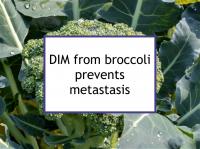A new study has investigated the effects of 3,3'-diindolylmethane (DIM) on mammary cancer metastasis in a mouse model of breast cancer. DIM is a metabolic product of indole-3-carbinol (I3C), which is found in cruciferous vegetables. Mammary carcinoma cells were injected into female mice who were then administered DIM daily.
DIM consumption was found to cause a marked reduction in the number of lung metastasis nodules. This reduction was accompanied by reduced levels of compounds associated with metastasis. The authors conclude that DIM has potential as an antimetastatic agent for the treatment of breast cancer.
Findings confirm previous studies concerning DIM
This study extends the result of a previous 2005 study which found that DIM inhibited the growth of transplanted human breast cancer cells in mice. Numerous other studies have found that DIM reduces the growth, proliferation and migration of human breast cancer cells in the laboratory. DIM also can increase the effectiveness of paclitaxel chemotherapy.
Foods that contain I3C
Although both DIM and I3C are available in supplement form, we do not recommend taking these supplements. Foods such as broccoli, bok choy and collard greens that contain I3C also contain other chemopreventive compounds such as sulforaphane. Also, the anticancer properties of such vegetables are likely to be the result of synergistic interaction of their various chemical components - isolated components have successfully inhibited proliferation in the laboratory, but their efficacy and safety in humans needs to be evaluated in large-scale clinical trials. There is some evidence that concentrated cruciferous vegetable extracts can act as estrogen agonists and promote breast cancer cell proliferation. Levels of DIM adequate
foodsfoods
for breast cancer chemoprevention can readily be obtained by eating cruciferous vegetables and condiments made from them:Note that cruciferous vegetables contain enzymes that can interfere with the formation of thyroid hormone.
